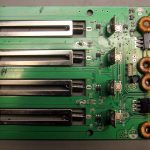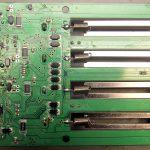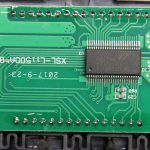BitBastelei #270 - Lii-500 Batterieladegerät (18650, Ni-HM, etc)
(347.6 MB) 00:18:21
2018-01-21 11:00
🛈Ich nutze häufig Li-Ion-Akkus der Bauform 18650 – egal ob Eigenbau-Powerbank, Taschenlampe oder mobile Sensoren, die Zellen sind recht praktisch. Viele dieser Zellen sind nicht neu, sondern aus alten Laptop-Akkus entnommen. Dessen Funktion zu testen ist mit dem bisherigen Imax B6 etwas mühsam – die Einstellungen müssen manuell vorgenommen werden, zudem kann immer nur eine Zelle getestet werden. Abhilfe verspricht der Lii-500. Dieser hat 4 unabhängige Schächte und kann Li-Ion und NI-MH-Zellen unabhängig voneinander Laden und Testen. Da ich ihn für grade mal 10€ bei einem Fernost-Shopping-Festival (*) aufgegriffen habe sicher ein Versuch wert.
Korrekturen
- 07:32 1.3Ah natürlich, nicht mAh
BitBastelei #269 - Vom Schrott-Monitor zur Lampe
(158.6 MB) 00:17:50
2018-01-14 11:00
🛈Alte oder Kaputte Flachbildschirme in den Schrott? Nicht so schnell: Mit ein paar Handgriffen lassen sich diese Geräte in eine nützliche Lampe umwandeln.
BitBastelei #268 - USV Wandlermodul
(247.1 MB) 00:23:07
2018-01-07 11:00
🛈Da war ja was. Vor langer Zeit hatte ich mal Teile einer defekten Groß-USV anschauen können. Also ziehen wir das Ding nochmal hervor und schauen, was in einem solchen Modul steckt.
Zum Aufbau: Das gezeigte Modul enthält Gleich- und Wechselrichter, PFC, DC-DC-Booster sowie die Ladeelektronik und ist für bis zu 3.5kVA Dauerlast ausgelegt (also 3.5kVA Eingang und 3.5kVA Ausgang). Die USV selbst bestand aus mehreren dieser Module im Hauptgehäuse sowie mehreren Batteriegehäusen. Es handelte sich um ein Doppelwandlersystem mit echtem Sinus.
08:45 Oops, falsche Einblendung
11:35 Ich hab keine Ahnung was ich da rede…
Uff – doch glatt im Congressgetümmel den Wochentag verwechselt. Dann machen wir halt etwas Improvisation…
Mailbag „AirMouse“, Feinstaub-Impovisation und Q&A
BitBastelei #267 - Asus Gaming Monitor: Fehlersuche und Reparatur
(357.8 MB) 00:38:14
2017-12-24 11:00
🛈Gaming-Hardware ist etwas, von dem ich normal die Finger lasse: Häufig steckt in der Packung mehr Marketing als Technik. Bei diesem Gaming-Monitor der Firma Asus scheint aber doch etwas brauchbares rauszupurzeln: 1440p und 144Hz. Und spätestens bei einem Blick auf den Neupreis von 650€ können wir die Reparatur ja mal versuchen – meist reichen bei sowas schließlich Bauteile für ein paar Cent.
BitBastelei #266 - Ubiquiti UniFi WiFi System
(92.3 MB) 00:34:56
2017-12-17 11:00
🛈Was zuhause oft ein einfacher Router wie z.B. die FritzBox erledigt ist in großem Stil nicht mehr ganz so einfach: WLAN. Wenn hunderte Access Points konfiguriert und gewartet werden müssen kommt daher fast immer ein System mit zentralem Management zum Einsatz. Mit den UniFi-System hat Ubiquiti die Preise der Konkurrenz deutlich unterboten – schauen wir mal, ob die Geräte auch bei mir durchhalten und mit 802.11ac die Videobearbeitung am Laptop flotter machen können.
Inhalt
- 00:00 Was hab ich vor
- 01:02 Controllerbasierte WiFi-Systeme
- 02:48 Ubiquity UniFi
- 04:23 Inhalt: UAP-AC-Pro
- 07:29 Inhalt: UAP-AC-Lite
- 09:19 Übersicht: Andere Modelle
- 10:54 Controller-Download
- 11:48 Controller für Gentoo und Arch
- 17:07 Controller Ersteinrichtung
- 18:50 Controller Funktionsübersicht
- 27:58 Transfertests
- 29:44 Meinung
Produktlinks
Weitere Links
Disclaimer
Alle Geräte wurden selbst gekauft oder geliehen. Amazon Affiliate-Links: Durch Nutzung erkennt Amazon, dass Ihr über meine Seite zu ihnen gefunden habt. Ich werde prozentual an euren Umsätzen beteiligt. Für euch bleiben die Preise natürlich gleich.
BitNotice #128 - Schlösser: Jetzt mit Anti-Terror-Funktion - Lockpicking war gestern
(45.1 MB) 00:02:43
2017-12-14 11:00
🛈(Achtung, erhöhter Sarkasmusgehalt)
Ich habe, um besser Dinge zeigen zu können, bei einem Händler ein transparentes Vorhängeschloss bestellt. Groß war meine Überraschung, dass man selbst in diesem Niedrigpreissegment die Ermittlungsbehörden bei ihrem Kampf gegen den Terror unterstützt und passende Alternativzugänge bereitstellt.
BitBastelei #265 - DSO138 Oszilloskop-Bausatz
(396.9 MB) 00:38:24
2017-12-10 11:00
🛈Oszilloskope sind hochkompliziert und teuer – was soll man dann von einer 15€-Tüte erwarten, welche sich als Oszilloskop zum Selberbauen bezeichnet?
Inhalt
00:37 Der Bausatz
03:15 Aufbau
19:29 Funktionstest
21:30 Fehlersuche
26:09 Fertigstellung
34:04 Wie schlägt er sich?
Links
BitBastelei #264 - Fehlersuche: Etikettiergerät
(456 MB) 00:20:24
2017-12-03 11:00
🛈Alle Etikettiergeräte fliegen hooooch. Naja, das dachte sich offenbar der Besitzer dieses Modells. Offenbar hatte es den Dienst gleich an mehreren Stellen quittiert und flog daraufhin nicht nur sprichwörtlich aus dem Fenster. Nu denn, einen Blick können wir ja mal wagen, denn das innere solcher Geräte ist meist recht stabil.
Produktlinks:
BitBastelei #263 - Dell Server Fehlersuche
(180 MB) 00:32:22
2017-11-26 11:00
🛈Another one bites the dust. Mein Backupserver ließ sich beim letzten Versuch nicht mehr einschalten. Schauen wir mal, was ich seinerzeit darin verbaut hatte und ob wir noch etwas retten können.
(Ja, CMOS-Reset hatte ich auch versucht…)





